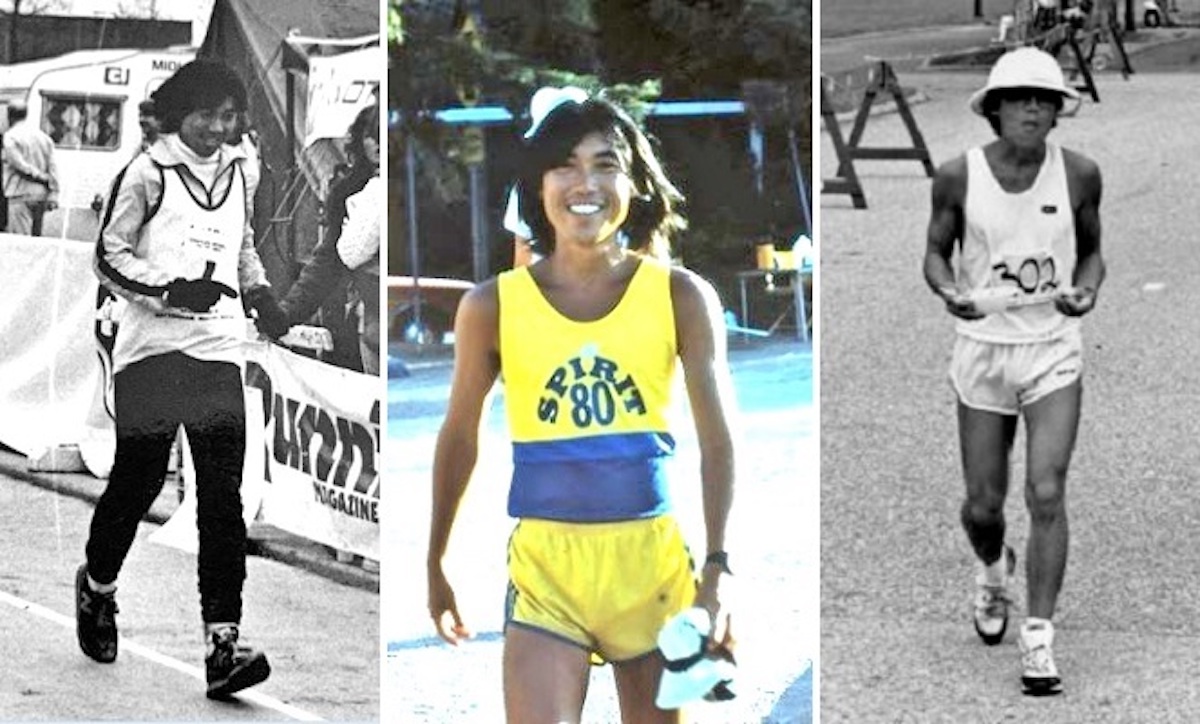[Editor’s Note: Since this article was written, Jo Zakrzewski has faced disqualification from the 2023 GB Ultras Manchester to Liverpool 50-mile race on April 7 for using a car for assistance. At the time of publication, her previous 48-hour world record detailed below, which is still awaiting ratification, is unaffected by this.]
The 48-hour running event has been getting renewed interest lately. The women’s world record, or more accurately — best performance — has been bettered twice this year. Britain’s Joasia “Jo” Zakrzewski recorded 411.458 kilometers/255.668 miles in Taiwan on February 12, 2023. This run, which is still awaiting ratification from the International Association of Ultrarunners (IAU), improved the previous record of Poland’s Patrycja Bereznowska by 8k.
Camille Herron then traveled to Australia to run in the 2023 Sri Chinmoy 48 Hour Festival on the weekend of March 24 through 26. In 48 hours, she ran 1,088 laps of the track at the Australian Institute of Sport in Canberra, Australia, to improve Zakrzewski’s mark by 23.8k to 435.366k/270.505 miles.
Herron’s astounding feat led me to look at the progression of both the women’s and men’s 48-hour world records, and to ponder if Yiannis Kouros’s seemingly impregnable men’s 48-hour record could be challenged in the foreseeable future.
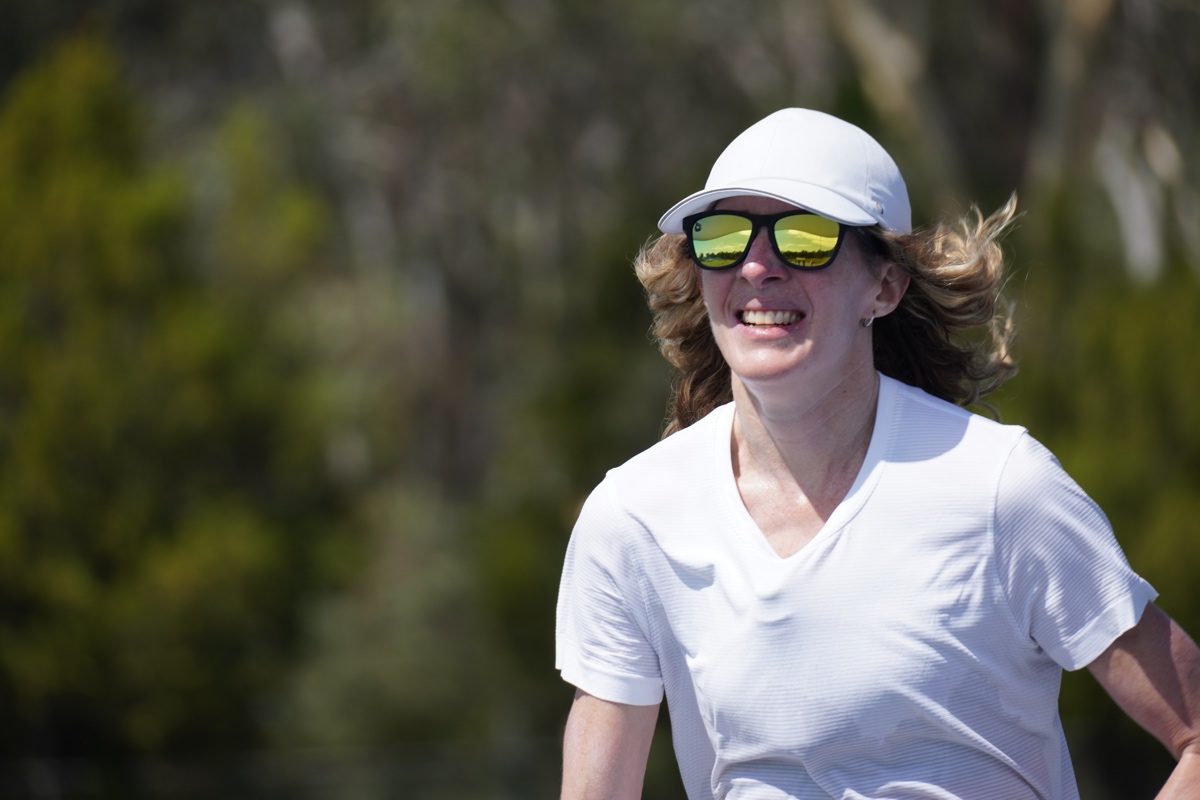
Camille Herron en route to the 48-hour world record at the 2023 Sri Chinmoy 48 Hour Festival in Australia. Photo: Sri Chinmoy 48 Hour Festival
Progression of the Women’s 48-Hour World Record
While historically, women covered 48 hours in hiking expeditions, the first recorded 48-hour world record, according to the DUV website, was set in 1979.
American Marcy Schwam was one of six runners and the only female at the 1979 David Copperfield 48-Hour Track Ultramarathon in Woodside, California. Schwam was one of the early American pioneers of women’s ultrarunning and ran 220.948k (137.291 miles).
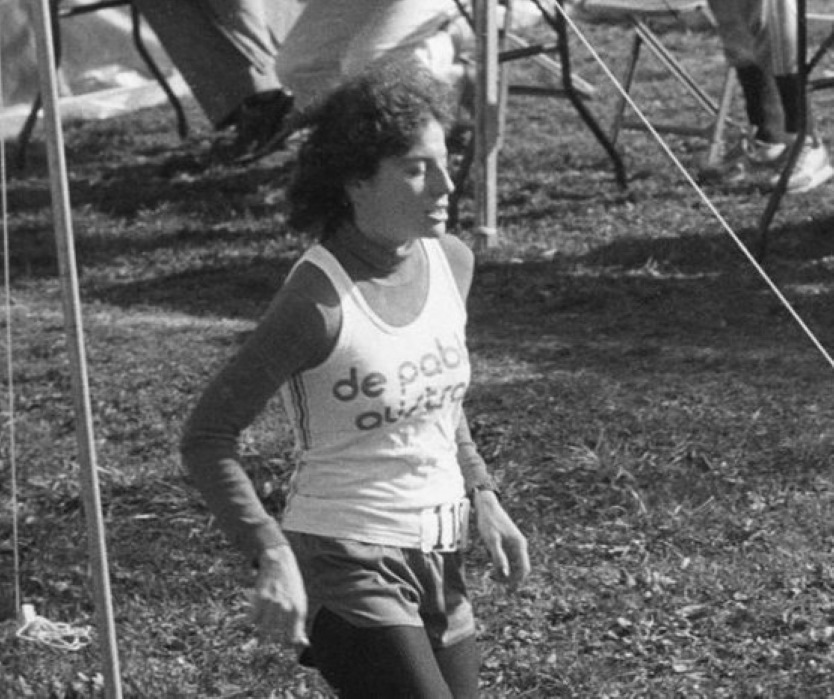
Marcy Schwam, who set the first women’s 48-hour world record in 1979. Photo: Sri Chinmoy Marathon Team
Three years later, in 1982, U.K.’s Anne Sayer achieved 294.114k (182.753 miles) at a 48-hour track race in Nottingham, England. Sayer was a remarkable lady — an international rower who took to long-distance hiking and then long-distance race walking. She became a race-walking Centurion when completing a competitive 100-mile walk in The Netherlands in 1977, recording 21 hours and 45 minutes.
There was a revival of 24-hour and 48-hour track events in Europe in the 1970s and 1980s. Sayer took part in a 48-hour track race where she was the only female competitor. Her distance was acknowledged as a new world record.
Women’s distance running was still evolving at this time and seeking better recognition. The first international marathon championships to include women were not held until 1983, in Helsinki, Finland. Norway’s Grete Waitz won those, with Joan Benoit Samuelson (USA) becoming the inaugural women’s Olympic champion a year later in 1984 in Los Angeles, California.
Increasingly too, more women participating in ultramarathons. Interest in 48 hours from other European runners soon followed as a few more events blossomed. U.K. runners Eleanor Adams-Robinson and Hilary Walker were pioneers for women’s ultrarunning at this time. They both held the women’s 24-hour world record at different times and Adams-Robinson famously was the outright winner of Badwater 135 Mile in 1987. Adams-Robinson also embraced the challenge of multi-day races. She twice improved Sayer’s 48-hour world record, to take it over the 200-mile barrier to 334.030k (207.556 miles) by 1985.
The record baton passed across the English Channel in 1986 as French athlete Arlette Touchard added another 13k to the record. Two years later, in 1988, Hilary Walker reclaimed the record for the U.K., adding almost 20k to take the record distance out to 366.512k (227.739 miles) at the Blackpool 48 Hours Track Race in England.
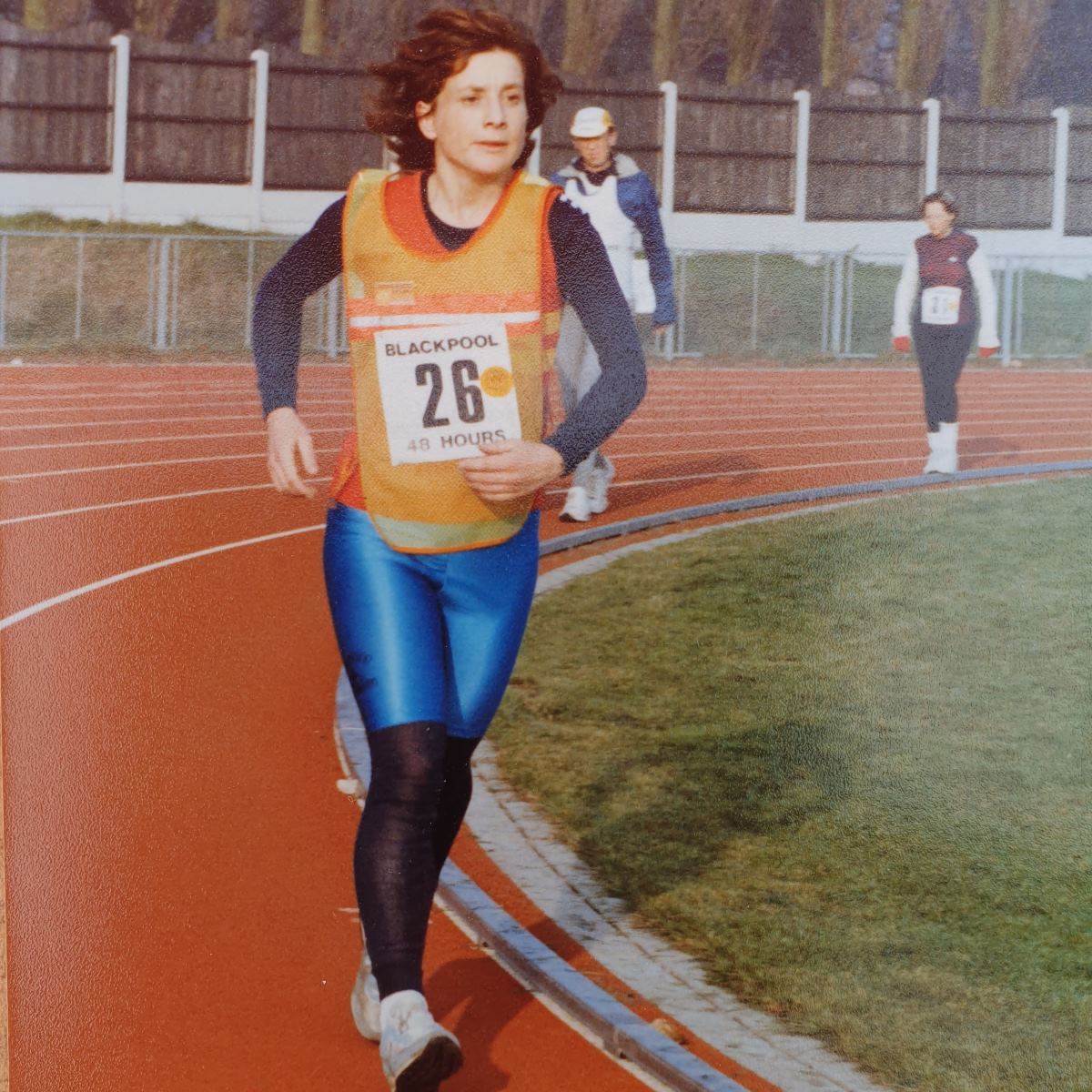
Hilary Walker on her way to setting a world record at the 1988 Blackpool 48 Hours Track Race. Photo courtesy of Hilary Walker.
It would be nine years until the record would be broken again. Americans Susan Olsen and Sue Ellen Trapp embraced 48-hour running during the 1990s. Both athletes had gradually improved their personal bests closer to the record before Trapp recorded 377.982k (234.867 miles) at the Surgères 48 Hour in France in 1977, to add 11k to Walker’s previous record.
Another nine-year gap and enter the Japanese. In the four years from 2006 to 2010, Sumie Inagaki, on three occasions, and Mami Kudo once, edged the record close to the 400k barrier.
Kudo, a prior IAU 24-hour world champion, pushed the mark out to 385.130k (239.308 miles) in 2009. Inagaki, another competent 24-hour runner and two-time winner at Badwater, improved this to 397.103k (246.748 miles) at the Surgères 48 Hour in 2010. Four hundred kilometers now seemed inevitable. However, it was eight years later, in 2018, when it finally happened.
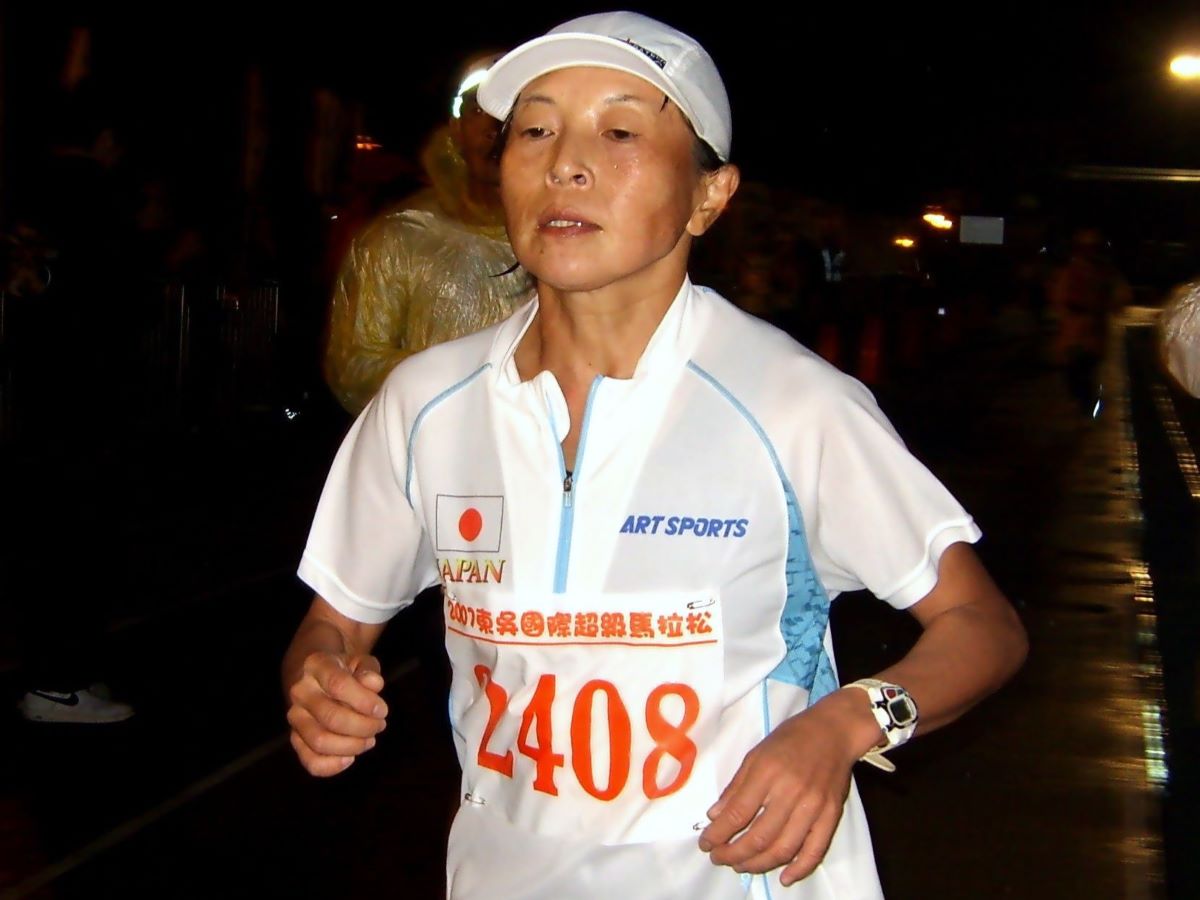
Sumie Inagaki at the 2007 Soochow International 24-Hour Ultramarathon. Photo: Rico Shen via Wikimedia Commons
Polish athlete Patrycja Bereznowska broke the women’s 24-hour world record at the IAU 24-Hour World Championships in Belfast, Northern Ireland, in 2017. She added the 48-hour world record to her resume at the Athens International Ultramarathon Festival the following year, recording 401.000k (249.169 miles). Four years later, in her home country, at the UltraPark Weekend 48 Hour, she improved that by 2k to 403.320 (250.611 miles). In doing so, she became the first woman to cross the 250-mile barrier in a 48-hour race.
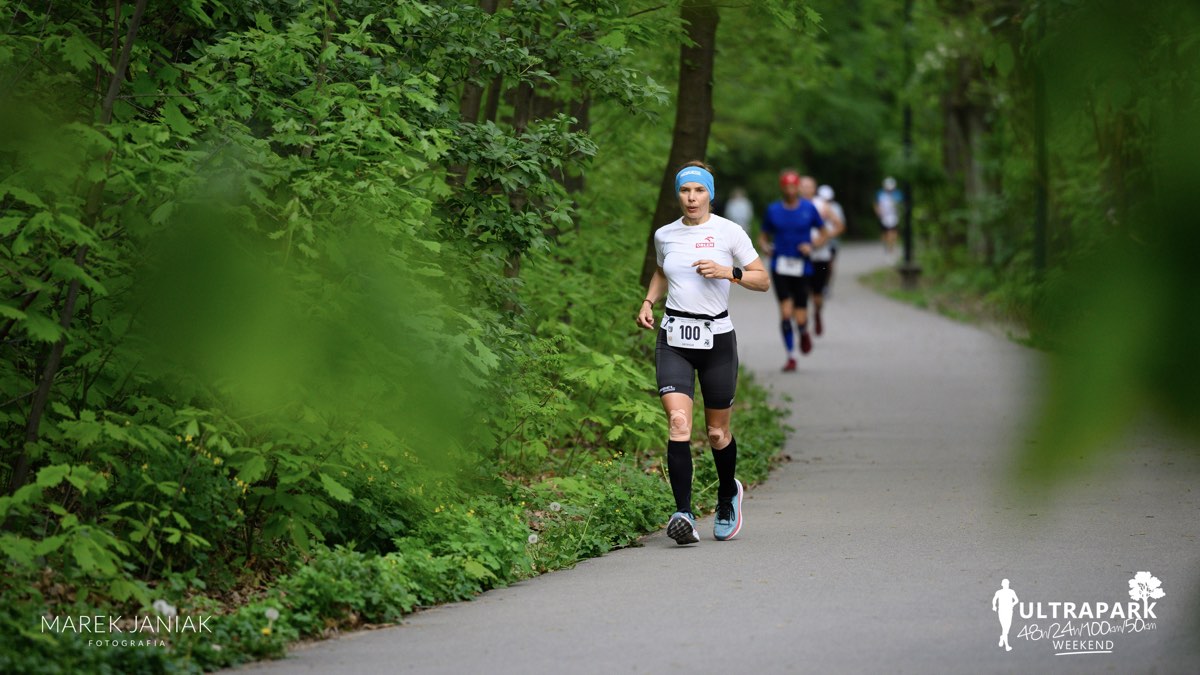
Patrycja Bereznowska on her way to setting a 48-hour world record at the 2022 UltraPark Weekend 48 Hour race in Poland. Photo: Marek Janiak/UltraPark Weekend
Fast forward to February 2023. Jo Zakrzewski heads to Taiwan to take part in the 48-hour event.
Taiwan is to stage the IAU 24-Hour World Championships later in 2023. Zakrzewski’s main aim was a solid 24-hour distance, while testing how she coped with the climatic conditions. Having reached 24 hours and surpassed 237k, she decided to press on. She was encouraged by the local support, who convinced her the 48-hour world record was achievable. She toughed out the second day to run 411.458k (255.688 miles), improving Bereznowska’s distance by 8k.
Step up Camille Herron and the 2023 Sri Chinmoy 48 Hour Festival in Australia in March 2023. Herron’s race was well documented. She improved the record distance by a whopping 23.87k. Her 435.336k (270.505 miles) makes her the third best athlete, man or woman, in the 48-hour event. In addition, she now holds the outright American record, having also run further than any U.S. men at the event.
Progression of the Men’s 48-Hour World Record
There were undoubtedly some 48-hour distances posted in the pedestrian era of the late 1800s. Races were organized at distances of up to six days. The tracks were of varying lengths. Many were indoors and put together especially for the events.
In the modern era, the first men’s distances recorded were at Woodside, California, in 1979. It was the same event where Marcy Schwam had set a women’s record. Don Choi, from San Francisco, had developed as a very competent ultrarunner and started organizing his own events too. He was instrumental in setting up the Woodside event and ran in it himself. He ran 329.167k (204.534 miles), setting a modern-day marker.
European interest rose. The men’s world record for 48 hours would be bettered no less than five times in the two years between April 1982 and March 1984.
The U.K.’s Mike Newton ran 365.623k (227.187 miles) on April 12, 1982, at Nottingham, England — the same event where Anne Sayer had increased the women’s mark. Newton increased Choi’s distance by over 35k.
Barely eight weeks later, on June 5, 1982, the French got in on the act. Ramon Zabalo edged the record upward by just under 3k and ran 368.348k (228.880 miles) at an event in Toulouse, France.
Zabalo’s compatriot, Jean-Gilles Boussiquet, next pushed this up to 381.600k (237.115 miles) at a six-day race organized at Montauban, France, in February 1983.
The cross-channel rivalry continued when three months later, in May 1983, the U.K.’s Dave Dowdle was on the start line at a 48-hour race in Gloucester, England. Dowdle had set a new men’s 24-hour world record at the same Gloucester track 12 months earlier. Forty-eight hours later, he was the proud owner of the 48-hour world record, having pushed Boussiquet’s mark up another 2.5k to 384.050k (238.637 miles).
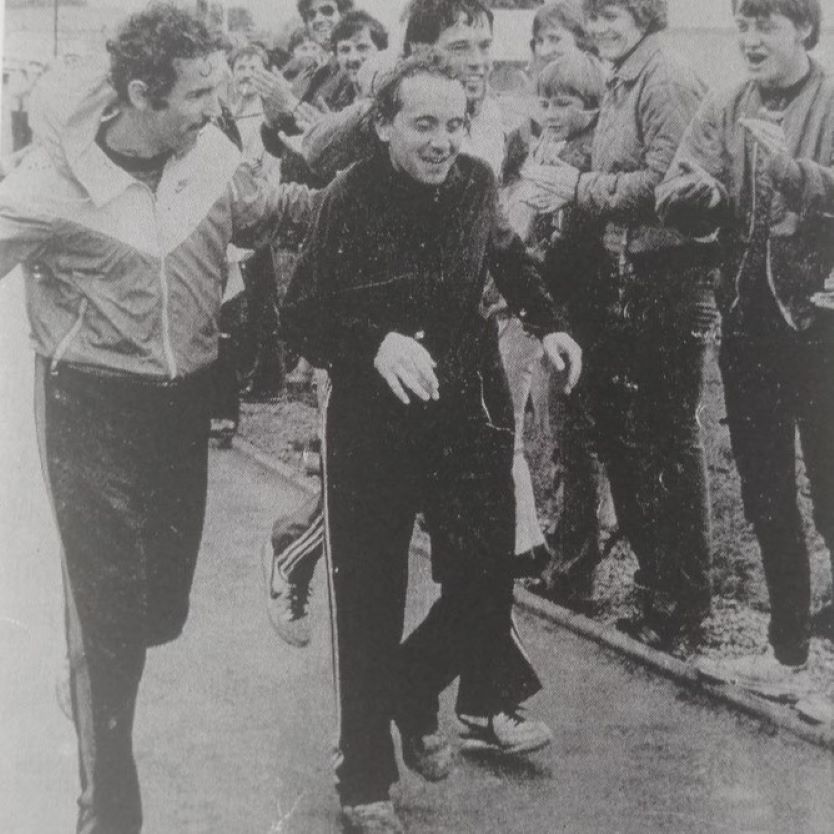
Dave Dowdle (right) toward the end of the 1982 Gloucester 24 Hour Track Race. The Gloucester 24 Hour Track Race is now held annually and the Gloucester 48 Hour Track Race bi-annually at the same track. Photo courtesy of the Gloucester Athletics Club.
The following March 1984, Zabalo, obviously putting to good use lessons learned in his previous record, improved the distance by a much larger margin. He added over 35k, becoming the first runner to surpass 400k, in recording 420.000k (260.975 miles). This mark had the potential to last a few years.
But no one was yet reckoning on the talents of a certain Greek runner, Yiannis Kouros.
In the first week of July 1984, barely four months after Zabalo set that 420k, Kouros — with Zabalo, Don Choi, and current women’s 48-hour world record holder Eleanor Adams-Robinson in the field, took part in a six-day race in New York.
Kouros, with his trademark commitment to front running, reached 48 hours with a distance of 429.014k (266.516 miles), an improvement on Zabalo’s March distance by 9k.
While mere mortals would have been happy with that and pulled up, Kouros continued for the whole six days, setting a modern-day six-day world record of 1,003.556k (623.581 miles).
Kouros could run at ease and recover quickly, at any distance from 24 hours upward. It resulted in him setting, and still holding, the six best 48-hour distances of all time. He also broke the world record on three of those occasions.
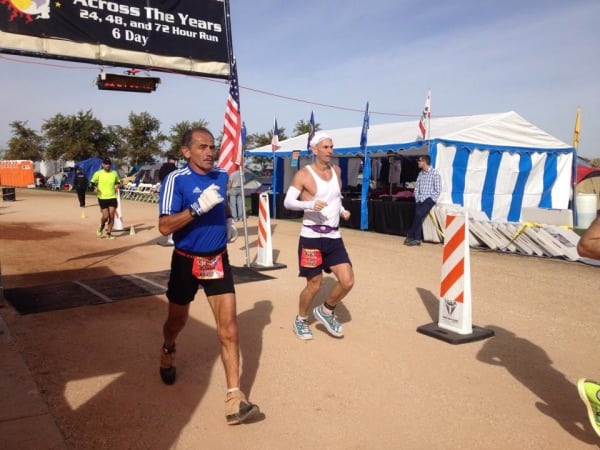
Yiannis Kouros (left) and Joe Fejes at the 2013-2014 Across the Years Six-Day Race. Photo: Aravaipa Running
He increased it by 23k to 452.270k (281.027 miles) on March 17, 1995 in Montauban, France. Then, less than eight weeks later, at the Surgères, France, event, he added another 18k when running 470.781k (292.529 miles).
The following year, 1996, he again improved it by a more modest 2.7k to 473.495k (294.216 miles), the current men’s 48-hour world record.
The Future of the 48-Hour World Record
Leaving aside that Kouros has the best six 48-hour distances ever, only he and the Ukrainian Andrii Tkachuk, with his 435.446k, have run further than Camille Herron’s recent mark of 435.366k.
Yes, you figured that out! Herron was less than 100 meters behind Tkachuk in being the second overall human at 48 hours behind Kouros.
The ability of women in many endurance events to excel as the challenge gets longer has been well documented. Herron’s 48-hour record is yet another illustration of that.
Apart from Kouros, has any male runner really attempted to push the boundaries of what is achievable at 48 hours to a 21st century test?
Looking ahead, what will the future hold? It will take a special athlete to challenge Kouros’s mark. And Herron has certainly not ruled out the possibility of trying to improve her distance in the future.
She commented after the race, “I have already started analyzing my race to figure out how I can go further.”
There is also the intriguing possibility that the recent interest generated in the 48-hour event on the women’s side will encourage someone to tackle the men’s record held by Kouros.
Kouros made both the 24-hour and 48-hour events his own in the 1980s and 1990s.
His 48-hour world record, ultrarunning analysts say, looks almost unassailable.
However, they said that about his 24-hour world record until a certain Lithuanian runner, Aleksandr Sorokin, proved otherwise.
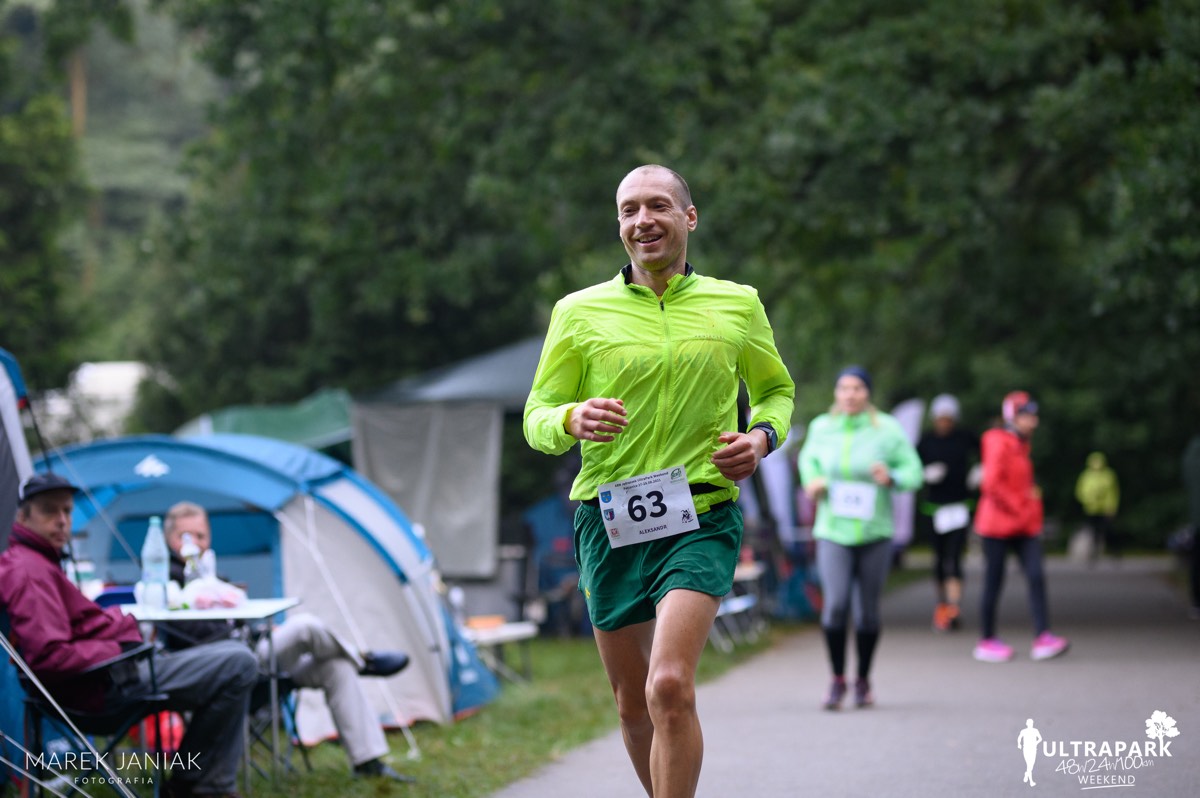
Aleksandr Sorokin on his way to setting a new 24-hour world record at the 2021 UltraPark Weekend 24 Hour race in Poland. Photo: Marek Janiak/UltraPark Weekend
The American marathon legend Bill Rodgers once commented: “My record will go, and that will be good. I like to see records broken. That is what running is all about.”
Call for Comments
What are your predictions for the future of male and female 48-hour running records?
